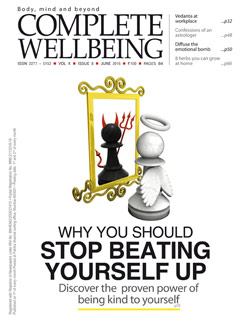
How do you react when you make a mistake? When you fare worse than your peers? When you feel less than your friends? It’s a good bet that you berate and belittle yourself for not matching up to your expectations of yourself. Most of us tend to judge ourselves too harshly; we are prone to be overly self-critical of our so called failures and inadequacies. We also like to compare ourselves with others and strive to be better than them. But that’s an impossible pursuit. No matter how hard we try, there will always be someone better than us. This is a set-up for disappointment and disillusionment. We then start blaming ourselves for not being good enough. But self-blame only pushes us further down the negative spiral. Our self-confidence takes a beating and we become hopeless.
Self-criticism and self-judgement is a destructive habit that creates unhappiness and heartburn, unnecessarily. The way to break out of this longstanding bad habit is to treat yourself like you would a loved one—with compassion. Think for a moment and you will realise that you tend to be gentle and kind with the flaws of your loved ones. There’s no reason why you shouldn’t treat yourself just as gently and kindly. Best-selling author and spiritual teacher Jack Kornfield says, “If your compassion does not include yourself, it is incomplete.” This month Kristin Neff, a self-compassion researcher and a professor of psychology, tells you why compassion for self is vital for your happiness and success and how you can go about cultivating it.
To explain what is meant by self-compassion, the author first explains the real meaning of compassion and how everyone, regardless of their deeds, deserves it. Then, she makes a clear distinction between self-compassion and conceit or self-centredness. “Self-compassion,” she writes, “involves wanting health and wellbeing for oneself and leads to proactive behaviour to better one’s situation, rather than passivity. And self-compassion doesn’t mean that I think my problems are more important than yours—it just means I think that my problems are also important and worthy of being attended to.” Later, Kristin shares two exercises designed to help you explore and cultivate self-compassion.
This cover story is meant to help you discover perfection in your imperfections; it gives you blanket permission to care for yourself just like you care for your loved ones. Go ahead, make full use of the permission and then share your experiences with me. Write to me at ma**********@co***************.com—I would love to hear from you.

